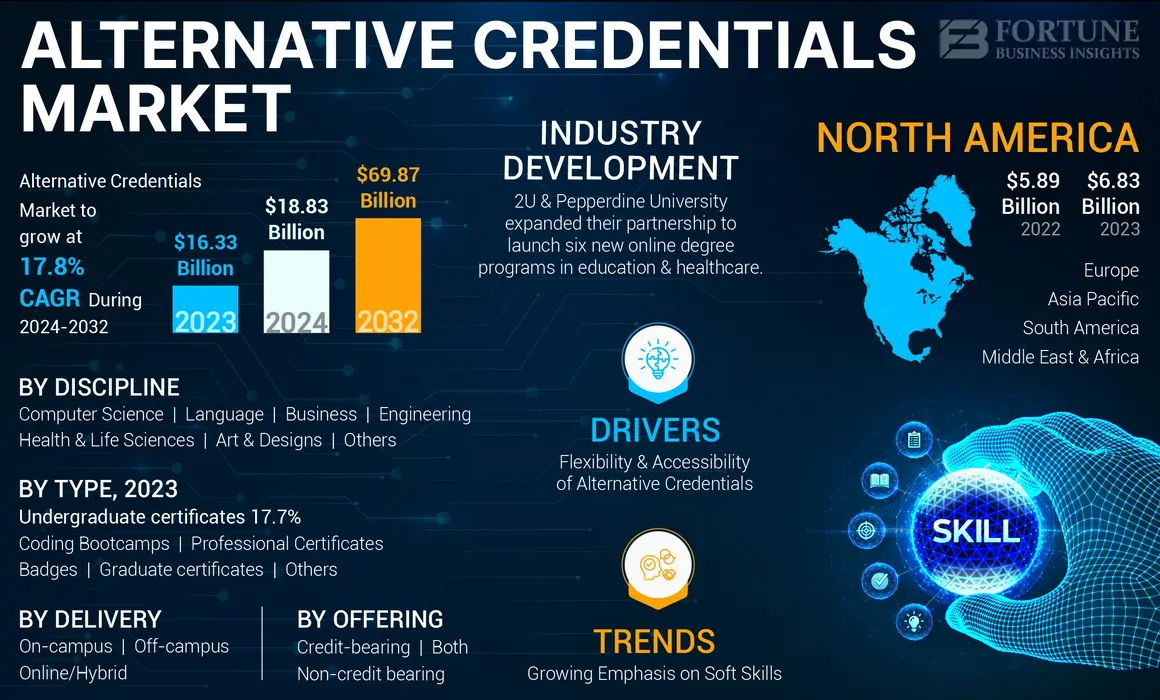
The global education landscape is undergoing a significant transformation, with alternative credentials emerging as pivotal tools in bridging the gap between traditional education and the evolving demands of the workforce. According to a comprehensive report by Fortune Business Insights, in the latest update of March 2025 the alternative credentials market was valued at USD 16.33 billion in 2023 and is projected to reach USD 69.87 billion by 2032, exhibiting a robust CAGR of 17.8% during the forecast period.
Defining Alternative Credentials
Alternative credentials encompass non-traditional certifications designed to develop specific skills and competencies outside conventional degree programs. These include professional certificates, micro-credentials, digital badges, nanodegrees, and coding bootcamps, all offering flexible and targeted learning opportunities tailored to industry needs.
The Importance of Durable Skills
While technical skills are essential for performing specific job tasks, there is a growing recognition of the importance of durable skills—such as leadership, communication, and teamwork—in the modern workplace. Alternative credential programs are increasingly incorporating these competencies to meet the holistic needs of employers.
Investing in durable skills is not just beneficial for individual career development but also makes sound business sense. Companies that prioritize these skills often see improved employee engagement, better team dynamics, and increased adaptability to change. This emphasis aligns with the broader trend of organizations seeking well-rounded professionals who can navigate complex interpersonal and organizational challenges.
Market Drivers
Several factors are propelling the growth of the alternative credentials market:
Flexibility and Accessibility: These credentials offer learners the ability to acquire new skills at their own pace, often through online or hybrid models, making education more accessible to a diverse population.
Employer Recognition: As industries rapidly evolve, employers are increasingly valuing specific skill sets over traditional degrees, leading to a higher acceptance of alternative credentials in hiring processes.
Technological Advancements: The proliferation of digital platforms has facilitated the widespread availability and recognition of alternative credential programs, enhancing their credibility and reach.
Regional Insights
In 2023, North America dominated the alternative credentials market, accounting for 41.82% of the global share. This leadership is attributed to early adoption of alternative credential programs and a strong presence of leading EdTech companies. Europe and Asia Pacific are also notable markets, with Asia Pacific expected to witness a high growth rate due to increasing internet penetration and a burgeoning demand for skills-based education.
Impact of COVID-19
The COVID-19 pandemic significantly accelerated the growth of the alternative credentials market. Lockdowns and social distancing measures led to a surge in online learning, prompting both individuals and organizations to seek flexible, skill-focused educational opportunities. This shift has solidified the role of alternative credentials in the modern education ecosystem.
Conclusion
The alternative credentials market is poised for substantial growth, driven by the need for flexible, accessible, and industry-aligned education. The increasing emphasis on durable skills alongside technical expertise reflects a recognition of the holistic needs of modern workplaces. As employers continue to recognize the value of specific skill sets, alternative credentials are set to play a crucial role in shaping the future of education and workforce development.
